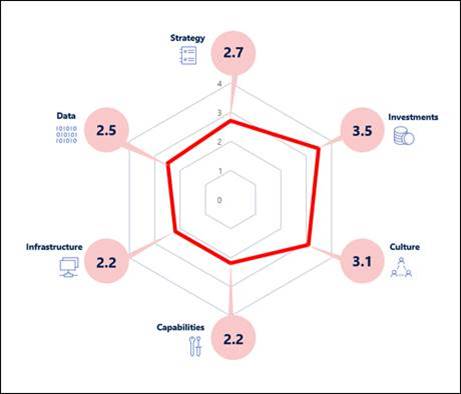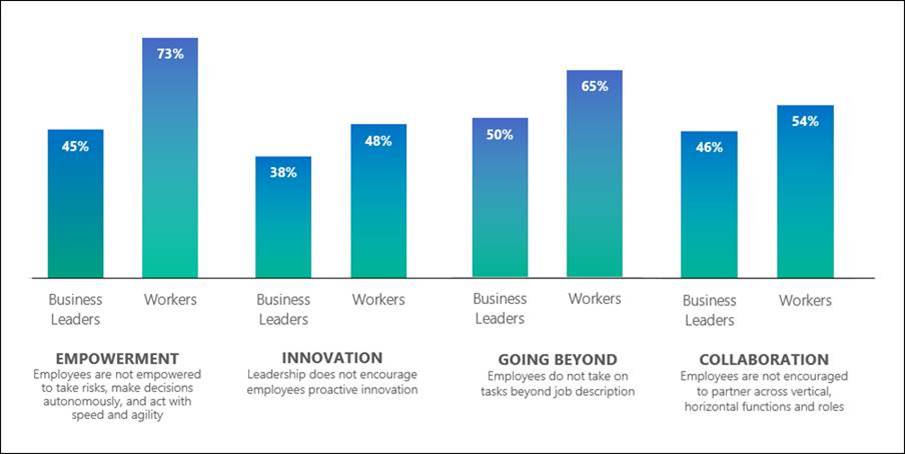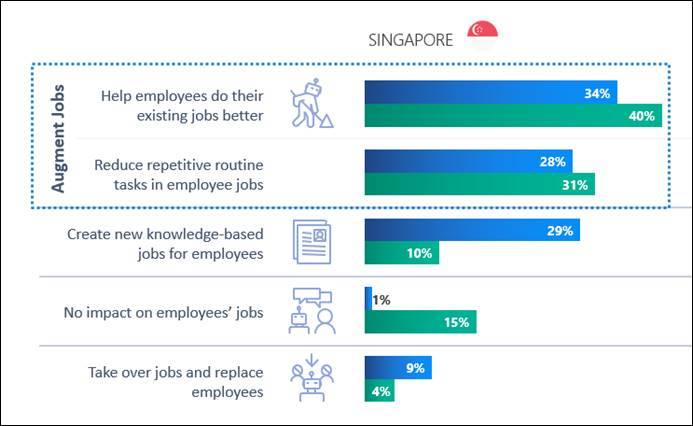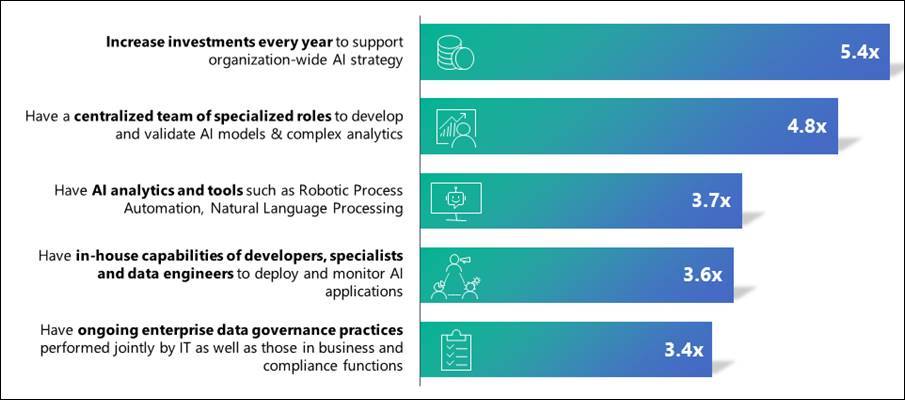- Artificial Intelligence (AI) will accelerate the rate of innovation and employee productivity improvements to nearly double in Singapore by 2021.
- Despite clear benefits in adopting the technology, only 59% of organisations in Singapore today have embarked on their AI journeys.
- Culture and Skills are among key barriers for organisations to succeed in AI.
- Singapore needs to focus on improving its AI readiness, specifically in infrastructure dimension, to ensure the success of its AI journey.
SINGAPORE, 20 FEBRUARY 2019 – By 2021, Artificial Intelligence (AI) will allow the rate of innovation and employee productivity improvements in Singapore to nearly double (X1.9 times and X1.7, respectively), according to business leaders in Singapore. The study from Microsoft and IDC Asia/Pacific, Future Ready Business: Assessing Asia Pacific’s Growth Potential Through AI[1] surveyed over 104 business leaders and over 102 workers in Singapore.
While more than 80% of business leaders polled agreed that AI is instrumental for their organisation’s competitiveness, only 59% of organisations in Singapore have embarked on their AI journeys. Those organisations that have adopted AI expect it to increase their competitiveness 1.7 times by 2021.
“Today, every company is a software company, and increasingly, every interaction is digital. To be successful in this new world, organisations need to be a fast adopter of best-in-class technology; and secondly, they need to build their own unique digital capabilities,” said Kevin Wo, Managing Director, Microsoft Singapore. “AI is the defining technology of our time that significantly accelerates business transformation, enables innovation, boosts employee productivity, and ensures further growth. Economies and businesses that have yet to embark on their AI journey run a real risk of missing out on the competitive benefits that are enjoyed by leaders.”
Why adopt AI?
For the organisations that have implemented AI initiatives, the top five business drivers to adopt the technology were (in priority order): Better customer engagement (32% of respondents named it as the number one driver); higher competitiveness (19%); accelerated innovation (16%); higher margins (15%); and more productive employees (6%).
Victor Lim, Vice President, Consulting Operations, IDC Asia/Pacific said: “Last year, organisations that have adopted AI saw tangible improvements in those areas in the range of 16% to 26%. They forecast further improvements of at least 1.6 times in the three-year horizon, with the biggest jump expected in accelerated innovation.”
 Fig 2: AI improves business today and in three years
Fig 2: AI improves business today and in three years
Singapore needs to build on infrastructure
The study evaluated six dimensions critical to ensuring the success of a nation’s AI journey. It uncovered that Singapore needs to build upon its infrastructure in order to accelerate its AI journey.
 Fig 3: AI Readiness in Singapore (Scale of 0.00 – 4.00)
Fig 3: AI Readiness in Singapore (Scale of 0.00 – 4.00)
“Singapore is not ready yet for AI. To succeed in AI race, markets in the region need to substantially improve their readiness. Organisations’ leadership should make AI a core part of their strategy and develop a learning agility culture. They have to continuously invest in this transformative technology for the long-term success, sometimes without immediate returns,” Lim said. “There is an urgent need for talents and tools to develop, deploy and monitor AI models, along with the availability of a robust data estate with the adequate governance.”
Business leaders who are adopting AI face three top challenges: a lack of thought leadership and leadership commitment to invest in AI; a lack of tools and infrastructure to develop actionable insights; and a lack of skills, resources and continuous learning programs.
The study showed that to move ahead on their AI journeys businesses have to create the right organisational culture. More than half of the business leaders and workers surveyed believe that cultural traits that support AI journeys, such as risk-taking, proactive innovation, as well as cross-function partnerships among teams, are not pervasive today.

Fig 4: Cultural Traits in an Organisation to Support AI Journeys
“Business leaders must now embrace a new culture, where innovation and continuous learning are core components of the organisational culture. It sets the stage for agility, adaptability and growth,” said Wo.
Organisations need to address skills challenge for an AI-enabled workforce
The study found that Singapore’s business leaders and workers hold positive viewpoints about the AI’s impact on the future of jobs. The majority (62% of business leaders and 71% of workers) believe that AI will either help to do their existing jobs better or reduce repetitive tasks.
 Fig 5: Perception of AI’s impact on jobs (Business Leaders and Workers)
Fig 5: Perception of AI’s impact on jobs (Business Leaders and Workers)
“When it comes to creating or replacing jobs, 29% of business leaders believe that AI will produce new jobs, whereas 9% feel that the technology will replace jobs. Interestingly, workers are more optimistic, with only 4% expecting AI to replace jobs, and 10% anticipating AI to create new ones,” said Lim.
The study also found that workers are more willing to reskill than business leaders believe they are. 20% of business leaders say it may be too difficult for workers to develop new skills, whereas only 12% of workers felt that it was a challenge.
“Microsoft’s vision for AI is first and foremost about people. AI technology cannot progress without them. This means that millions will need to transform themselves into skilled workers as well as learners that an AI future needs,” said Wo. “It is heartening to see that 80% of businesses prioritise skilling and reskilling of workers in the future. They plan to invest as much, or even more, in human capital than in new technology. Even so, 75% of business leaders have yet to implement plans to help their employees to acquire the right skills, which is worrying in today’s context. They must have the urgency to support the fundamental shift in training workers for the future.”
“The jobs of today will not be the jobs of tomorrow, and we have already seen demand for software engineering roles expand rapidly beyond just the tech sector. However, building an AI-ready workforce does not necessarily mean an acute need for technological skills,” added Wo.
The top three future skills required by business leaders in Singapore include creativity, digital skills and critical thinking. The demand for all three is higher than the existing supply.
The study also uncovered that business leaders value soft skills more than workers expect. The biggest skills gaps identified were in:
-
- Adaptability and continuous learning (26-pt difference)
- Creativity (14-pt difference)
- Digital skills (14-pt difference)
AI Leaders: Robust strategy, capabilities and skills provide an edge
The study identified 6% of organisations which are AI Leaders. These organisations have already incorporated AI into their core business strategy and nearly doubled their business benefits today as compared to other organisations. Compared to the rest of the organisations in Asia Pacific:
 Fig 6: Traits of an AI Leader against Followers
Fig 6: Traits of an AI Leader against Followers
For more information, visit https://news.microsoft.com/en-sg/ai-for-everyone/
____________________________
[1] About the study Future Ready Business: Assessing Asia’s Growth Potential Through AI
- 1,605 business leaders and 1,585 workers (104 business leaders and 102 workers in Singapore) participated in this study.
- Business leaders: Business and IT leaders from organisations with more than 250 staff were polled. Respondents were decision makers involved in shaping their organisation’s business and digital strategy.
- Workers: Respondents screened have an understanding of Artificial Intelligence today, and do not play a role in decision making process within their organisation.
- 15 Asia Pacific markets were involved: Australia, China, Hong Kong, Indonesia, India, Japan, Korea, Malaysia, New Zealand, Philippines, Singapore, Sri Lanka, Taiwan, Thailand and Vietnam.
Industries polled included agriculture, automotive, education, financial services, government, healthcare, manufacturing, retail, services and telco/media.
###
About Microsoft
Microsoft (Nasdaq “MSFT” @microsoft) is the leading platform and productivity company for the mobile-first, cloud-first world, and its mission is to empower every person and every organization on the planet to achieve more.





